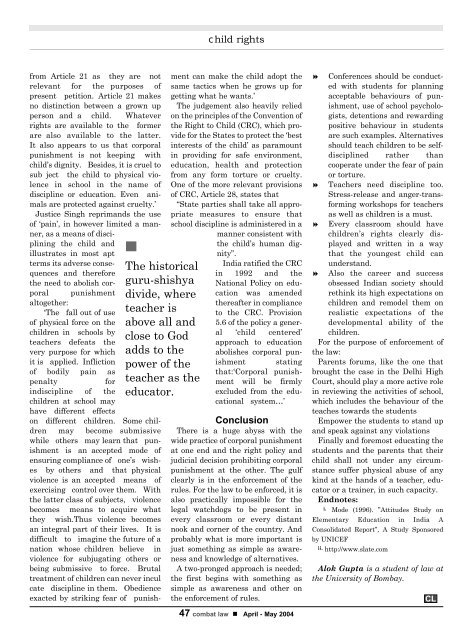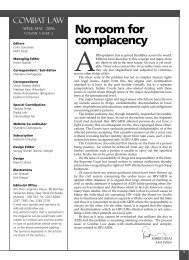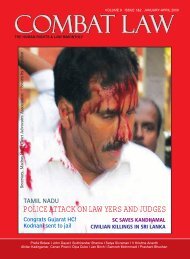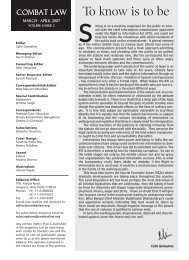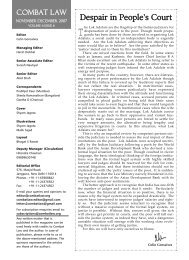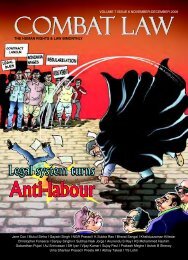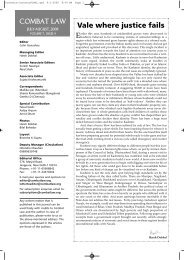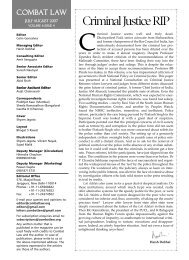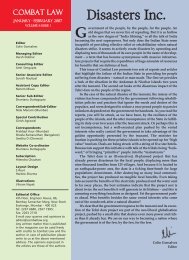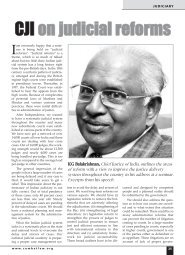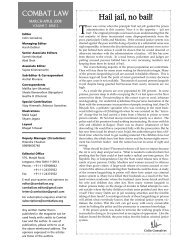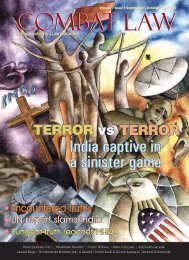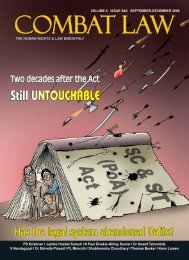PDF, 1.1MB - Combat Law
PDF, 1.1MB - Combat Law
PDF, 1.1MB - Combat Law
Create successful ePaper yourself
Turn your PDF publications into a flip-book with our unique Google optimized e-Paper software.
child rightsfrom Article 21 as they are notrelevant for the purposes ofpresent petition. Article 21 makesno distinction between a grown upperson and a child. Whateverrights are available to the formerare also available to the latter.It also appears to us that corporalpunishment is not keeping withchild’s dignity. Besides, it is cruel tosub ject the child to physical violencein school in the name ofdiscipline or education. Even animalsare protected against cruelty.’Justice Singh reprimands the useof ‘pain’, in however limited a manner,as a means of discipliningthe child andillustrates in most aptterms its adverse consequencesand thereforethe need to abolish corporalpunishmentaltogether:‘The fall out of useof physical force on thechildren in schools byteachers defeats thevery purpose for whichit is applied. Inflictionof bodily pain aspenaltyforThe historicalguru-shishyadivide, whereteacher isabove all andclose to Godadds to thepower of theteacher as theeducator.indiscipline of thechildren at school mayhave different effectson different children. Some childrenmay become submissivewhile others may learn that punishmentis an accepted mode ofensuring compliance of one’s wishesby others and that physicalviolence is an accepted means ofexercising control over them. Withthe latter class of subjects, violencebecomes means to acquire whatthey wish.Thus violence becomesan integral part of their lives. It isdifficult to imagine the future of anation whose children believe inviolence for subjugating others orbeing submissive to force. Brutaltreatment of children can never inculcate discipline in them. Obedienceexacted by striking fear of punishmentcan make the child adopt thesame tactics when he grows up forgetting what he wants.’The judgement also heavily reliedon the principles of the Convention ofthe Right to Child (CRC), which providefor the States to protect the ‘bestinterests of the child’ as paramountin providing for safe environment,education, health and protectionfrom any form torture or cruelty.One of the more relevant provisionsof CRC, Article 28, states that“State parties shall take all appropriatemeasures to ensure thatschool discipline is administered in amanner consistent withthe child’s human dignity”.India ratified the CRCin 1992 and theNational Policy on educationwas amendedthereafter in complianceto the CRC. Provision5.6 of the policy a general‘child centered’approach to educationabolishes corporal punishmentstatingthat:‘Corporal punishmentwill be firmlyexcluded from the educationalsystem…’ConclusionThere is a huge abyss with thewide practice of corporal punishmentat one end and the right policy andjudicial decision prohibiting corporalpunishment at the other. The gulfclearly is in the enforcement of therules. For the law to be enforced, it isalso practically impossible for thelegal watchdogs to be present inevery classroom or every distantnook and corner of the country. Andprobably what is more important isjust something as simple as awarenessand knowledge of alternatives.A two-pronged approach is needed;the first begins with something assimple as awareness and other onthe enforcement of rules. Conferences should be conductedwith students for planningacceptable behaviours of punishment,use of school psychologists,detentions and rewardingpositive behaviour in studentsare such examples. Alternativesshould teach children to be selfdisciplinedrather thancooperate under the fear of painor torture. Teachers need discipline too.Stress-release and anger-transformingworkshops for teachersas well as children is a must. Every classroom should havechildren’s rights clearly displayedand written in a waythat the youngest child canunderstand. Also the career and successobsessed Indian society shouldrethink its high expectations onchildren and remodel them onrealistic expectations of thedevelopmental ability of thechildren.For the purpose of enforcement ofthe law:Parents forums, like the one thatbrought the case in the Delhi HighCourt, should play a more active rolein reviewing the activities of school,which includes the behaviour of theteaches towards the studentsEmpower the students to stand upand speak against any violationsFinally and foremost educating thestudents and the parents that theirchild shall not under any circumstancesuffer physical abuse of anykind at the hands of a teacher, educatoror a trainer, in such capacity.Endnotes:i. Mode (1996). ”Attitudes Study onElementary Education in India AConsolidated Report”, A Study Sponsoredby UNICEFii. http://www.slate.comAlok Gupta is a student of law atthe University of Bombay.CL47 combat law • April - May 2004


